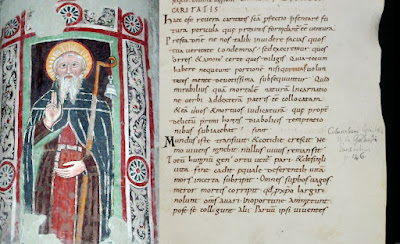A missing line in Columbanus’s De mundi transitu
The Irish missionary Columbanus (540-615) founded monasteries in France and Italy and was also known to have written pieces in verse. His De mundi transitu is a short but highly wrought poem, written in a style that is typical for Hiberno-Latin poets of the early Middle Ages. It consists of 120 heptasyllabic lines, divided into thirty stanzas of four lines each. In addition to rhyme, which occasionally extends to three syllables, the poem also features alliteration. The topic of the poem is the fleeting nature of earthly delights; everything that is joyful in this life (beauty; wealth; youth) passes:
Cottidie decrescit
Vita praesens quam amant;
Indeficiens manebit
Sibi poena quam parant.[The present life that they love declines daily; the penalty they prepare for themselves remains unfailingly.]
Columbanus, “De mundi transitu”, ll. 21-24.
Therefore, Columbanus (540-615) holds, a true Christian should focus on the permanence found in Heaven.
This beautiful and powerful poem survives in only one manuscript, which was copied in the 9th century in the Abbey of Saint Gall, Switzerland. When the 9th-century scribe copied the poem, he made a crucial error. Rather than copying line 106 of the poem, his eyes skipped across the page of his exemplar and he accidentally copied out the last part of the wrong line: line 102, which now occurs twice in the manuscript, but does not make any sense in the second instance (a description of Heaven).
zie voor het volledig verhaal en het volledige artikel (free source) deze link

